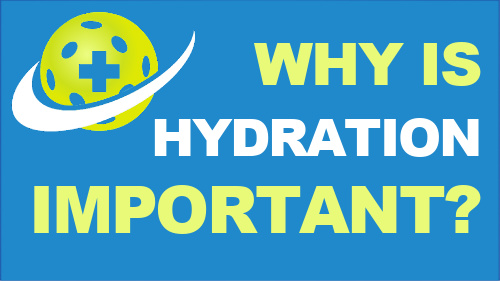It’s a familiar sight at any athletic event: the cyclist snatching a drink from a nearby support vehicle, or (hopefully) a pickler grabbing their water bottle between games. Athletes (and yes, picklers ARE athletes) know that hydrating is critical to their performance. But why? In this post, we’ll explore the link between hydration and optimal athletic performance. The human body comprises around 60% of water, and it’s an essential component of the body’s many processes. It acts as a lubricant, it regulates body temperature, and it helps flush out toxins. In an athletic environment, it’s essential for proper muscular and nervous system function, as well as regulating body temperature. If an athlete is dehydrated, muscles cramp, energy levels plummet, and focus disappears. Dehydration causes a significant reduction in performance at best, and puts the athlete at risk for heat exhaustion, heat stroke, and syncope at worst.
Why is hydration so important?
Hydration is the process of maintaining an adequate amount of water in the body to ensure proper functioning. Water is used for numerous functions such as lubricating joints, aiding in digestion, regulating body temperature, and transporting nutrients throughout the body. Therefore, as athletes strive to perform their best, they should pay close attention to their hydration levels. Even top athletes – believe it or not – ACTUALLY struggle with this. In a recent study, researchers found that 2 out of 3 Division 1 athletes at a single university suffered from ‘hypohydration’ before practice. This means they were under-hydrated before they even started exercising.
Recent studies have shown that even mild levels of dehydration can lead to decreased performance levels, impaired cognitive functioning, and general fatigue. Athletes who are not properly hydrated risk injury during physical exercise. For these reasons, it is essential that athletes take the initiative to stay well hydrated before, during, and after their workouts.
Understanding Hydration
Good hydration begins with understanding the body’s water balance. Water makes up roughly 60% of body mass and is necessary for the body’s basic functions. It helps in the absorption of nutrients and removal of waste, as well as assists in regulating temperature. To maintain this balance, the body needs to replace fluid lost via sweating, urinating, and other bodily functions.
Pickleball creates a unique situation for dehydration. A lot of picklers migrated from tennis, where the time between points (chasing down the ball, and the immense time wasted with service faults) is three times longer than in pickleball. What this means is that the body has more time to regulate temperature, heart rate, and breathing in tennis and far less time in pickleball. This translates into a higher average body temperature during exercise, leading to more rapid dehydration.
It is also important to remember that the body doesn’t just lose water during exercise. It burns fuel and loses sodium, potassium, calcium, which are key electrolytes involved in proper muscle performance. In addition, each athlete has their own ‘sweat rate,’ which means different hydration rules apply for different athletes.
Hydration for Athletic Performance
Proper hydration begins with understanding an athlete’s individual hydration needs, and consuming the right amount of water before, during, and after physical activity. Before hitting the courts, it is important to consume enough fluids. The National Athletic Trainers’ Association (NATA) recommends drinking approximately 16 oz of water or sports drink 2 to 3 hours before exercise and additional 8 oz of water or a sports drink 10 to 20 min before exercise. Consider downing that water from a high quality, BPA-free water bottle like this one. (that’s just a shameless plug to our friends over at Takeya)
In addition to ‘pre-hydrating’ with water before exercise, it’s recommended that athletes ‘bank’ some extra electrolytes in their system. Since there is no easy way to detect proper electrolyte levels in the body, it is unlikely athletes are getting enough just from their diets. Products like Pickleball Cocktail by Jigsaw Health or Hydration Tabs by Gu Energy Labs help prepare the body for athletic performance.
Following any amount of exercise on or off the court, post exertion hydration is also just as important. It speeds the recovery process as well as minimizes the amount of stiffness and soreness felt after. In addition, athletes will benefit from taking a magnesium supplement to minimize cramping later in the day.
Potential Consequences of Dehydration
Dehydration has a measurable impact on athletic performance. Even mild dehydration, which is defined as losing as little as 1.5-2% of body weight in fluids, can cause significant impairments in athletic performance. Decreased strength, loss of coordination and focus, and slower reactions are all results of even mild dehydration. As dehydration worsens and an athlete loses more than 5% of their body weight in fluid, their chances of injury increase. Furthermore, it can lead to severe medical conditions such as heat exhaustion and heat stroke and syncope (fainting).
Key Take-aways
Hydration levels influence athletic performance. Keeping the body fully hydrated before, during, and after exercise helps ensure all bodily functions, including muscular power and strength, operate at peak efficiency. Dehydration leads to decreased athletic performance, increased fatigue and muscle cramping, and can even increase the risk of injury. When coupled with proper nutrition and rest, hydration is the key to performing at your best and reaching peak athletic performance on the pickleball court.
Play On!

